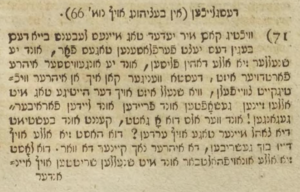TOGGLE COLUMNS (on/off):ADJUST COLUMN POSITIONS: select the column header cell and drag it where you want. show me!COPY INDIVIDUAL COLUMN(S): use CopyTables, a browser extension.
| Source (German) | Translation (English) |
|---|---|
Abend⸗Gebet. [№3] |
Evening Prayer. [№3] |
Wichtig kam mir jeder Tag meines Lebens bei dem Beginn des jetzt verflossenen Tages vor, und je schneller sie alle dahin fließen, und je ungewisser ihre Fortdauer ist, desto weniger kann ich an ihrer Wichtigkeit zweifeln, wie schnell ist auch der heutige Tag mit allen seinen Geschäften, seinen Freuden und Leiden vorübergegangen! und wer als du, o Gott, kennt und bestimmt die Zahl meiner Tage auf Erden? Du hast sie alle auf dein Buch geschrieben, da ihrer noch keiner da war, du läßt sie alle unaufhaltbar und mit schnellen Schritten auf einander folgen, bis der letzte von allen erscheint, der uns zu dir, unserem Vater und Richter, ruft, und uns in einen andern höheren Zustand versetzt. |
Every day of my life seemed important to me at the beginning of the day that has now passed, and the faster they all flow by, and the more uncertain is their continuance, the less I can doubt their importance, how quickly has this day also passed by with all its business, its joys and sorrows! and who but you, O God, knows and determines the number of my days on earth? You have written them all on your book, since there was none of them yet, you let them all follow each other unstoppably and with quick steps, until the last of all appears, which calls us to you, our father and judge, and transfers us into another higher state. |
Und dieser letzte Tag — wie bald kann er nicht für mich erscheinen! Wer versichert mir davon, daß ich das Licht des morgenden Tages erblicken, daß ich nicht diese Nacht dem Tode entschlafen werde? wie viele Tausende werden nicht wirklich in diesem kurzen Zeitraume ihr Ziel erreichen u. in die Ewigkeit übergehn, um da zu empfangen nach dem sie hier gehandelt haben, es sei gut oder böse. Wie sollte mir nicht jeder Tag wichtig sein, wie könnte ich einen Tag gedankenlos und leichtsinnig vertändeln oder verträumen? Ach nur zu oft verliere ich noch dich, den Zeugen und Richter meiner Handlungen, aus den Augen, darum geht noch so mancher Tag meines Lebens unbezeichnet von guten Thaten oder gar von Fehlern und Thorheiten entstellt dahin, und läßt so wenig Spuren hinter sich, auf die ich mit Zufriedenheit und Vergnügen zurück sehen könnte. Ach Herr, wer kann merken, wie oft er fehlt? verzeihe mir alle, auch die verborgenen Fehler, du weist, Allwissender, daß ich sie alle aufrichtig bereue und nichts sehnlicher verlange als immer vollkommener und besser zu werden, und alle Zeit, und alle Krafte die du mir schenkst, immer mehr so anzuwenden, wie es deinem Willen gemäß ist. O laß diesen Wunsch immer mehr That und Wahrheit werden! |
And this last day — how soon it cannot appear for me! Who assures me that I will see the light of the morning day, that I will not fall asleep to death this night? How many thousands will not really reach their goal in this short period of time and pass over into eternity, to receive there according to what they have acted here, be it good or evil. How should not every day be important to me, how could I waste or dream away a day thoughtlessly and carelessly? Oh, only too often I lose sight of you, the witness and judge of my actions, therefore many a day of my life goes by unrecorded by good deeds or even disfigured by mistakes and folly, and leaves so few traces behind that I could look back on with satisfaction and pleasure. Oh Lord, who can notice how often they are absent? Forgive me all, [for] even the hidden faults, you know,[1] Cf. Psalms 19:13. All-knowing One, that I sincerely regret them all and long for nothing more than to become more and more perfect and better, and to use all the time and all the strength you give me more and more according to your will. Oh, let this wish become more and more reality and truth! |
Allgütiger, was ich heute durch deine Kraft Gutes und Nützliches geredet und gethan, begonnen oder fortgesetzt habe, möge dein Segen erhalten und befördern. O möchte der verflossene Tag viel Freude und Glückseligkeit unter den Menschen verbreitet haben, und diese Nacht allen Betrübten und Elenden Ruhe und Erquickung gewähren. Amen. |
May your blessing preserve and promote all the good and useful things I have said and done, begun or continued, through your power today. O may the past day have spread much joy and happiness among men, and this night grant rest and refreshment to all the afflicted and miserable. Amen. |
“Desgleichen [Abend⸗gebet №3]” was translated/adapted by Yehoshua Heshil Miro and published in his anthology of teḥinot, בית יעקב (Beit Yaaqov) Allgemeines Gebetbuch für gebildete Frauen mosaischer Religion. It first appears in the 1829 edition, תחנות Teḥinot ein Gebetbuch für gebildete Frauenzimmer mosaischer Religion as teḥinah №71 on pp. 104-105. In the 1835 edition, it appears as teḥinah №73 on pp. 129-130. In the 1842 edition, it appears as teḥinah №76 on pp. 134-135.
We welcome corrections and improvements. The transcription of the German from Latin script in Fraktur type provided machine-readable text for a machine translation by DeepL, which we then edited for accuracy and clarity. –Aharon Varady
Source(s)


Notes
| 1 | Cf. Psalms 19:13. |
|---|

“Abend⸗Gebet [№3] | Evening prayer [№3], a teḥinah by Yehoshua Heshil Miro (1829)” is shared through the Open Siddur Project with a Creative Commons Attribution-ShareAlike 4.0 International copyleft license.
![Abend⸗gebet [№2] (In Bezug auf das obige Gebet) (Yehoshua Heshil Miro 1829) - cropped](https://opensiddur.org/wp-content/uploads/2022/05/Abend⸗gebet-№2-In-Bezug-auf-das-obige-Gebet-Yehoshua-Heshil-Miro-1829-cropped.png)
![Abend⸗gebet [№2] (Yehoshua Heshil Miro 1829) - cropped](https://opensiddur.org/wp-content/uploads/2022/05/Abend⸗gebet-№2-Yehoshua-Heshil-Miro-1829-cropped.png)








Comments, Corrections, and Queries